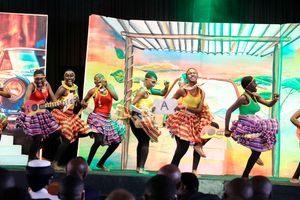
A crowd escort a school bus ferrying Butere Girls’ students from Melvin Jones Academy in Nakuru on April 10, 2025. The learners refused to perform the ‘Echoes of War’ play in the ongoing National Drama and Film Festivals.
In 1995, the conflict between art and politics took a deadly turn when Nigerian dictator Sani Abacha killed writer Ken Saro-Wiwa.
In a case of “art mimicking real life”, Saro-Wiwa’s life mirrored that of one of his characters in his short story, Africa Kills Her Sun, where the narrator writes a letter to his beloved before he is executed. He wonders why Africa doesn’t give opportunities to her best and brightest children.
The narrator says that, “I recall, many years ago as a young child, reading in a newspaper of an African leader who stood on the grave of a dead lieutenant and through his tears said: ‘Africa kills her sons.’ I don’t know what he meant by that, and though I’ve thought about it long enough, I’ve not been able to unravel the full mystery of those words. Now, today, this moment, they come flooding back to me. And I want to borrow from him. I’d like you to put this on my gravestone as an epitaph: ‘Africa Kills Her Sun.’ A good epitaph, eh? … I’m sure you’ll agree with me.
‘Africa Kills Her Sun!’ That’s why she’d been described as the Dark Continent? Yes? So, now…I’m done. My heart is light as the daylight which seeps stealthily into our dark cell. I hear the prison guard jangle his keys, put them into the keyhole. Soon he’ll turn it and call us out. Our time is up. My time expires and I must send you all my love. Goodbye”.
Like the narrator, it’s recorded that, “After arriving at Port Harcourt prison, Saro-Wiwa… was led to the gallows and executed by hanging. It took five tries to execute him due to faulty equipment. His last words were: ‘Lord take my soul, but the struggle continues’”.
And with that Saro-Wiwa lay dead probably the last thought being that he would never see his people or the countryside that probably shines with a tapestry of different greens, spotted generously with yellow and pink flowers, and the mist spiralling like white smoke. Never to see and enjoy the daffodils shimmering, the hint of blossom on the trees and the scent of new growth after the rains. Never to see the compounds always warming to the echoes of children’s noises in the rambling expanses in the thrill of the search for things that only children look for. Or maybe in the last moments he missed his wife and children or other relatives whose presence had blazed through past morning dawns as he smelt rosemary in the air.
Saro-Wiwa paid the ultimate price for dissent. This relationship between art and dissent has been highlighted in the last few weeks because of the play, “Echoes of War”, by Butere Girls (written by Cleophas Malala). No matter one’s perspective on the play, the nation has had a healthy debate on the work of art (read literature) in our society and politics.
Art can serve as a powerful tool for expressing dissent and challenging authority. Obviously, most governments, the world over, seemingly desire total supremacy and have imperialist impulses — tsarist ambitions that literature interrogates and, in the process, annoying the rulers. In the era of ‘spin’, ‘branding’, and ‘marketing’, rulers wish to have echo chambers — everyone parroting what they want to hear.
If governments had their way, they would entrench what one writer called “programmed ignorance that works as a political tool to advance and obscure hegemonic ambitions”. Governments would wish to keep some things from being known (wholesale sanctioning of ignorance) or at least to keep some things strategically ignored.
The conflict between writers and governments (with their imperialist bent) comes when writers pen literature that has the potential to critique and resist political hegemony. The play “Echoes of War” aptly showed the various roles literature can plan in society, much to the chagrin of political leaders.
The first role of literature is to challenge the status quo. Literature allows authors to challenge established and even accepted perspectives and therefore criticise established power structures, norms, and politics.
The second role of literature is to create alternative voices. Ken Saro-Wiwa was a voice for and fought for the rights of the minority Ogoni people in Nigeria. Through his works, he provided a platform for marginalised views excluded from mainstream discourse.
The third role of literature is to explore social issues. Writers can use literature as a force for justice and equality as they highlight complex social issues such as corruption, injustice, and oppression. As readers go through such works, they reflect on these issues.
The fourth role of literature is inspiring change. Literature challenges societal norms and provokes creative and critical thinking and this can inspire not only social but also political change. A good example of this is Ngũgĩ wa Thiong’o’s novel, Petals of Blood, where the character Karega embodies the struggle for social justice and change. He is a catalyst for a new paradigm shift, encouraging the community to unite and resist oppressive forces.
The writer is a book publisher based in Nairobi. johnmwazemba@gmail.com







